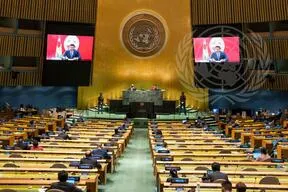Statement
Statement summary
FAURE ESSOZIMNA GNASSINGBÉ, President of Togo, said this year’s topic is a call to immediate action in health care, to stop the pandemic and tackle the social and economic damage it has wrought. The serious uptick in poverty and increased gap between developed and developing States mean that, according to the World Bank, the pandemic triggered the first recession in sub-Saharan Africa in the last 25 years — particularly worrying in countries with fragile economies. Given the urgency of seriously considering the indebtedness of developing countries, he welcomed last year’s G20 approval of the Debt Services Suspension Initiative but urged the international community to consider conclusions that emerged from the Paris summit on funding African economies towards recovery.
He noted the gap in vaccine access remains very pronounced, with countries in the Global North vaccinated at 50 per cent, while in Africa it is at a mere 1 per cent. The pandemic will only be successfully ended with equal distribution so African countries can undergo maximum vaccination towards effective global immunity. Similar to that gap, global recovery also runs the danger of separating the world into two blocs, with developed countries hoping to return to normal, while others face the real risk of resurgence of infection and death. “This bipolar picture of the world is not what we want to see,” he said.
Given current challenges, multilateralism cannot just be a diplomatic mechanism, but must create a world order of international relations, including cooperation, rule of law, collective action and the principle of global prosperity. Climate change has been the greatest challenge to humanity over past decades, and even more worrying, a report on the gap between needs and prospects in reducing effects of greenhouse gases shows that, even if all unconditional current commitments of the Paris Agreement are implemented, temperatures will still rise by 3.2°C. Collective efforts must be multiplied five-fold, he said, to ensure the goal of reducing emissions by 1.5°C, encouraging Governments, companies and all institutions to aim for carbon neutrality.
Despite challenges and impact on the economic sector, the well-being of the Togo people remains central to his Government. Togo aims to build on economic growth and poverty reduction, for a modern nation of cohesion and peace with inclusive and lasting growth. His Government passed a law for universal health-care coverage with free health care for pregnant women and newborns to reduce maternal and neonatal mortality. Significant progress has been made on gender equality, with women represented in decision-making bodies at 35 per cent, up from 23 per cent in 2019. Turning to the economy, he noted that in the 2021 United Nations Conference on Trade and Development (UNCTAD) report Togo ranked as one of the favourite countries for foreign direct investment in 2022. With intolerance and extremism still victimizing Africa, he called for urgent global action to aid countries and regional organizations to combat the scourge of violence. Citing funding difficulties for the Group of Five for the Sahel and United Nations Multidimensional Integrated Stabilization Mission in Mali (MINUSMA) which must be overcome, he called it incomprehensible that 50 per cent of pledged contributions to that body have not been disbursed.
Full statement
Read the full statement, in PDF format.
Photo

Previous sessions
Access the statements from previous sessions.
